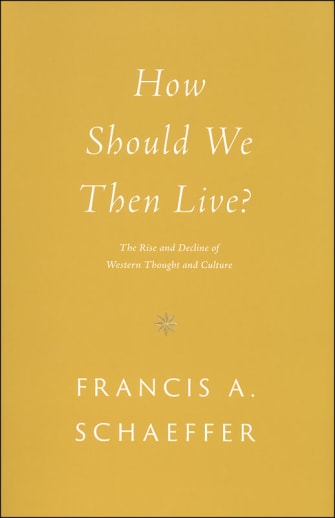How Should We Then Live? / Schaeffer
Description
As one of the foremost evangelical thinkers of the twentieth century, Francis A. Schaeffer long pondered the fate of declining Western culture. Profoundly aware of the similarities modern culture shares with societies that came before, Schaeffer embarked on a journey to uncover the movements that gave rise to modern culture and resulted in the decline of the Christian worldview.
Forty years later, his classic book How Should We Then Live? is as relevant today as it was when it was first published. Schaeffer argues that the erosion of society begins with a shift away from biblical truth. To support this claim, he walks readers through history, beginning with the fall of Rome, through the Middle Ages, the Enlightenment, and up to the twentieth century. This latest edition analyzes the reasons for modern society’s state of affairs and presents the solution: living by the Christian ethic, fully accepting God’s revelation, and affirming the morals, values, and meaning of the Bible.
- A Theology Classic: Written by renowned Christian philosopher Francis A. Schaeffer
- For Those Interested in Philosophy and History: Engages with the ideas of Plato, John Locke, Thomas Jefferson, and Voltaire, and examines the art, architecture, and ideas that shaped modern society
- Explores the Importance of a Christian Worldview: A practical assessment of the evolution of culture and the steadfast alternative offered by the biblical perspective
Here is one of the classic Christian worldview books, written by Francis Schaeffer, the founder of L'Abri Fellowship in Switzerland. This book delves into a variety of subjects ( philosophy, religion, history, art and music), discussing different viewpoints but arguing for the Biblical viewpoint. In an article on teaching worldviews (Practical Home Schooling, Sep/Oct 1996), Cathy Duffy says that she uses this book to review and tie ideas together after discussing a topic. However, she warns not to just turn a high school student loose with the book, since the student would not have the necessary background to understand it. A great resource to teach a Christian worldview.
| Product Format: | Softcover Book |
|---|---|
| Grades: | 11-AD |
| Brand: | Crossway Books |
| Author: | Francis A. Schaeffer |
| ISBN: | 9781433576911 |
| Length in Inches: | 8.5 |
| Width in Inches: | 5.5 |
| Height in Inches: | 0.875 |
| Weight in Pounds: | 0.95 |

